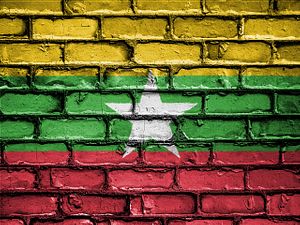As one of the few countries to hold actual elections in mainland Southeast Asia, Myanmar is more susceptible to public pressure relative to other countries such as Cambodia or Laos. And as evidence of that, in recent months, the government has caved on a series of controversial decisions that neighboring governments would have likely rammed through, whether it be the partial scrapping of a proposal to extend the school year by one month or the declining of major new development projects when Chinese President Xi Jinping visited in January.
But the country is also arguably more susceptible to some of the population’s uglier desires. And true to form, as Myanmar gears up for its forthcoming election expected later this year, nationalism is in the air in the country, with important implications both domestically as well as internationally.
Former military dictator Thein Sein – a key figure in Myanmar’s transition that began in the 2010s – first hinted at what was to come by emerging from relative obscurity to campaign for his old party, the military-aligned Union Solidarity and Development Party.
Speaking to thousands of supporters at USDP headquarters in January, the man who initiated Myanmar’s transition to democracy, which has captivated international attention for years since, had a dire warning.
“Because of neocolonialism under the disguise of democracy and human rights, our country is at the brink of being consumed by foreigners,” he said, warning that the country would soon be swallowed whole.
In February, nationalists rallied in downtown Yangon in support of the military, and the commander-in-chief received accolades from a powerful Buddhist organization. Senior General Min Aung Hlaing, who has been accused of spearheading the alleged genocide against the Rohingya, was given an award by the Young Man’s Buddhist Association for his work defending “race, language, [and] religion.”
Two local media outlets that reported on the rally were allegedly pressured by nationalist groups. Khit Thit Media issued a statement claiming it received threats, including a phone call from one of the rally’s organizers. 7Day News Daily removed its coverage from its website after reportedly receiving a late-night visit from nationalist monks.
While aggressive nationalism can be worrying in any political sphere, it’s especially troublesome in Myanmar, where it has been linked to the persecution and alleged genocide of Myanmar’s Rohingya Muslim minority. After Thein Sein spoke at the event in January, the audience posed with their arms in the shape of an X, reportedly a rejection of the Rohingya and The Gambia, a small African nation that has accused Myanmar of genocide against the Rohingya at the International Court of Justice.
During the rally in February, nationalists carried signs with phrases like “no Rohingya,” calling it a fake ethnic group.Myanmar does not officially recognize the Rohingya as an ethnic group, instead terming them “Bengalis” and illegal immigrants.
The USDP also slammed the ruling National League for Democracy when Yangon’s chief minister used the term Rohingya in a speech. Releasing a strongly worded statement, the USDP said the NLD was attacking Myanmar’s “nationalist spirit.” “Bengalis are trying to massively enter Myanmar by all means (using land, water, and aerial transportation),” the statement continued.
The USDP was badly beaten by the NLD in the 2015 election, winning only 5 percent of the seats in the country’s upper house of parliament. Desperate to avoid another humiliation, the aggressive rhetoric will likely only escalate the closer Myanmar gets to the election. But this rhetoric can have real consequences, and the Rohingya are worried.
“I don’t feel safe about the 2020 general election. It will be not safe either for the Rohingya or other ethnic groups in Myanmar,” said Khin Maung, executive director of the Rohingya Youth Association. Khin Maung also warned that in its desperation, the military may resort to “taking power again by using their guns.”
































